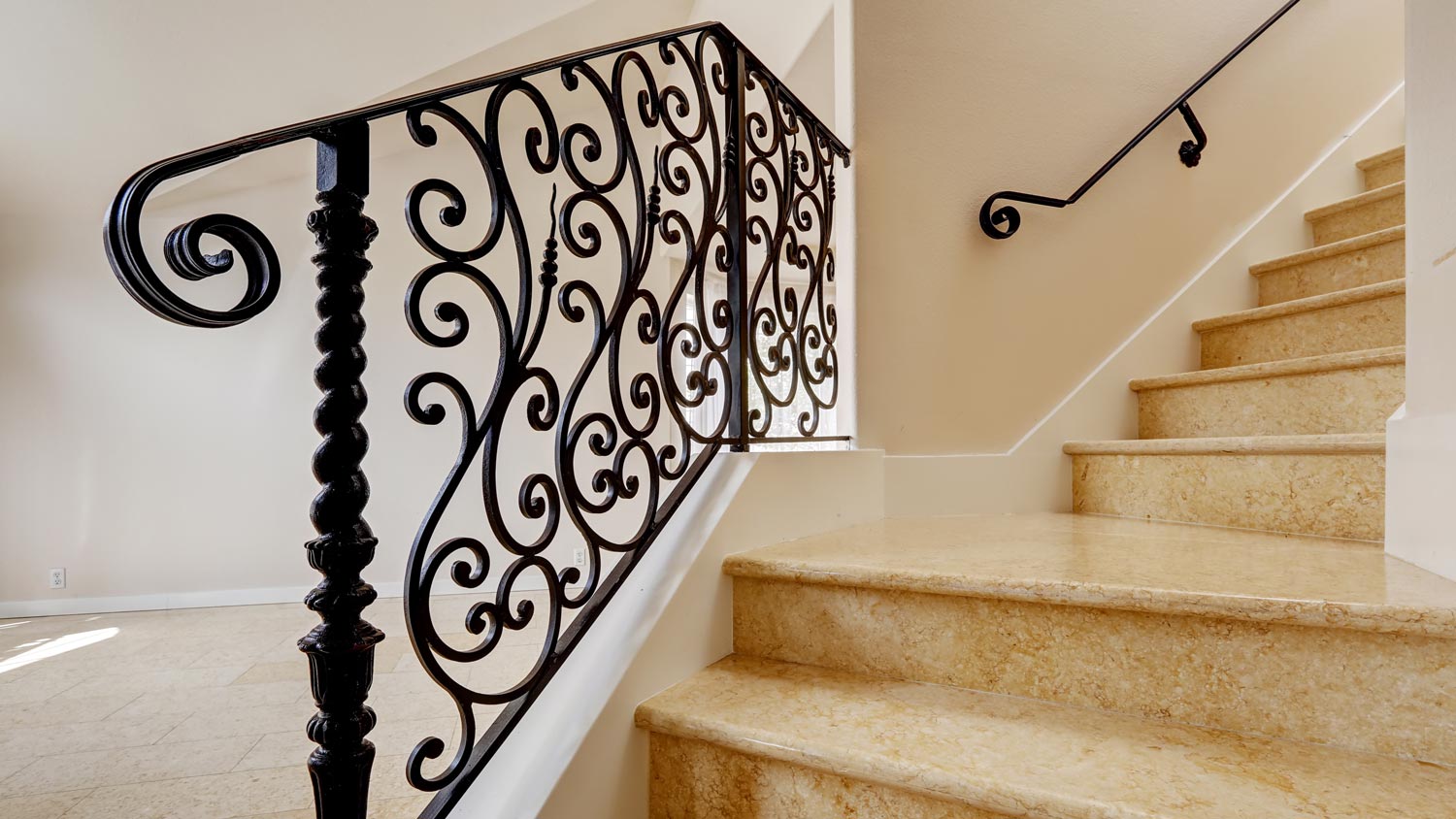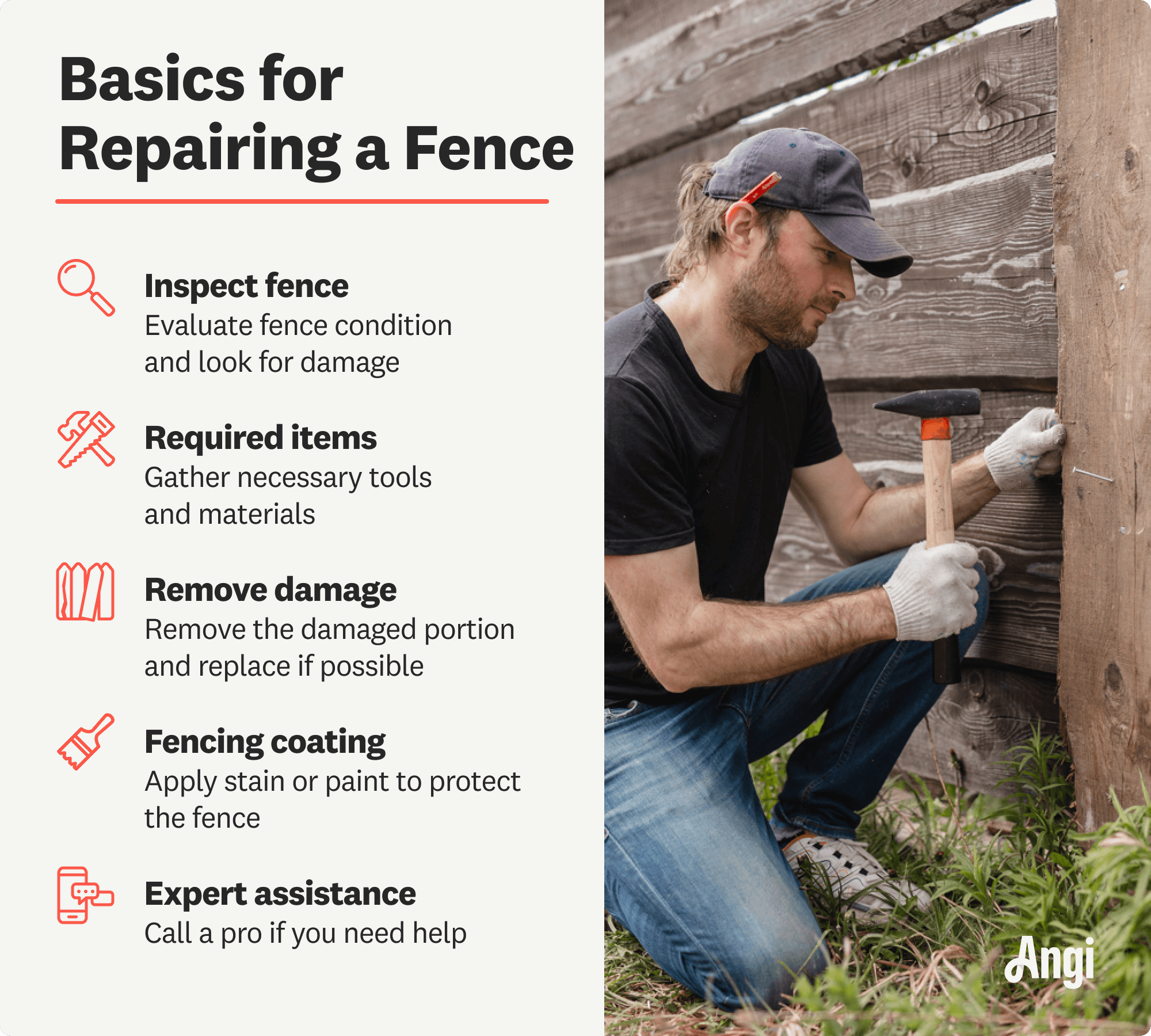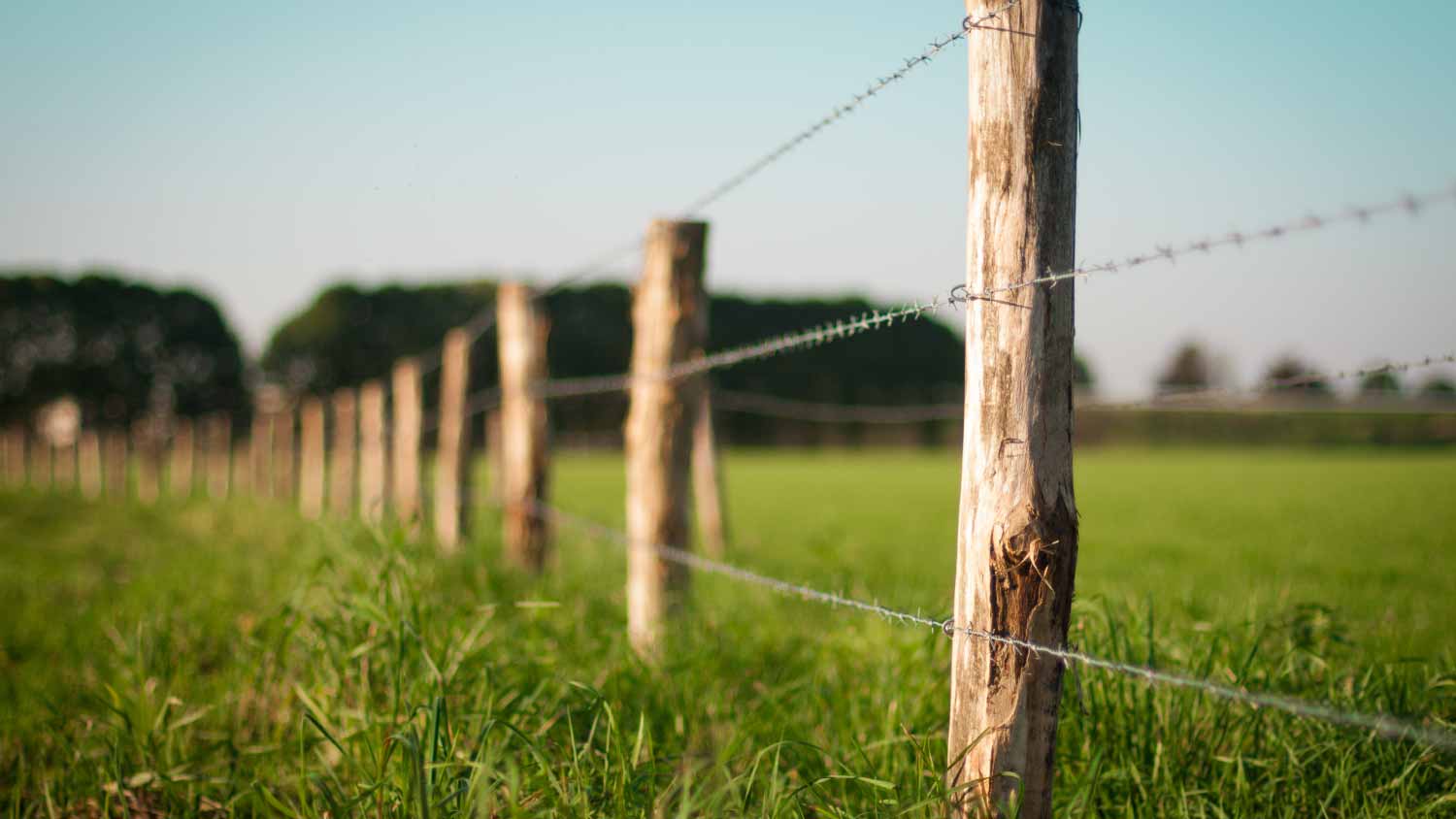
Get expert insights on wrought iron railing repair cost, including average prices, key cost factors, and tips to save on your next project.
If you’re on the fence about a fence replacement, this guide can help


If more than 20% of your fence is in need of repair, consider replacing the whole fence.
Double-check with your homeowners insurance to see if they’ll cover repair or replacement before making a decision.
Widespread rust, corrosion, and insect damage often call for a full replacement.
A few loose pickets and posts, as well as mild mold or mildew growth, call for a repair.
If your fence is in rough shape, it’s time to repair or replace the fence. Your fence frames your property—and you wouldn’t want to frame a gorgeous photograph in a broken picture frame. That said, sometimes things aren’t worth fixing. Replacing a fence (or at least replacing a portion of your fence) can be more cost-effective than major repairs—it just depends on the type of fence and the extent of the damage.
Deciding whether to repair or replace can be difficult. With our network of local pros, you can have a specialized professional figure out the next steps.
Not sure if you should repair or replace your fence? Here are a few factors to consider:
Extent of damage: Often, fencing professionals use the 20% rule to determine if you should repair or replace a fence. If more than 20% of the fence needs to be repaired, it’s probably a better use of your money to replace the fence entirely.
Age of fence: If your fence is relatively new, it may still have one or two decades left. Make small repairs when possible instead of replacing it. If it’s nearing the end of its life, replace it instead.
Quality of fence: If you don’t like your current fence—maybe you don’t love the material or the style, or it doesn’t offer the proper security or privacy—there’s no sense in repairing it if it’s undergone a moderate level of damage. Use this opportunity to replace it with the type of fence you’d prefer instead.
Cause of damage: If your fence is destroyed during a storm or some other natural disaster or accident outside of wear and tear, it’s likely your home insurance will cover the fence repair or replacement. In that case, leave it to the insurance adjuster to determine whether you should repair the broken portions or replace the entire fence.
Some small issues with your fence, such as peeling paint, are easy repairs. But other issues, such as extensive damage from insects, including termites, are a good indicator that you should replace the fence entirely. The table below walks you through multiple scenarios—and whether repairing or replacing the fence makes more sense.
| Issue with Fence | Repair or Replace |
|---|---|
| Sinking, sagging, bending, or warping | Replace, unless it’s limited to one or two panels |
| A handful of broken pickets or posts | Repair |
| Rust or corrosion | Replace, unless it’s limited to a small portion of the fence |
| Signs of insect damage | Replace, unless it’s limited to a small portion of the fence |
| Peeling paint or stain | Repair |
| Mold, mildew, or visible fungus | Repair, unless it’s extensive (more than 20% of fence) |
In general, a fence may last between 15 and 30 years when properly installed and maintained. However, the material of the fence plays a big role in how long your fence will last.
For instance, wood fences last between 15 and 20 years, on average, particularly if you use pressure-treated pine or oak. Choosing more expensive types of wood fencing, such as cedar, redwood, or cypress, can extend your fence’s potential lifespan to 25 or even 30 years.
Vinyl fences last between 20 and 30 years, on average, but with diligent care, some vinyl fences have been known to make it 50 years or more before needing to be replaced. Depending on the type of metal fence you choose, you can expect between 25 and 30 years for metal fencing.

The cost of repairing versus replacing a fence isn’t all that different. Most fence repairs cost between $10 and $30 per linear foot, while most fence installations cost between $6 and $50 per linear foot. In other words, which one is better really depends on the extent of the job.
The typical repair costs $300 to $900—but that can add up as your fence starts to age. If you know you’ll need multiple repairs in the near future, it might be worth it to get a new fence. Typically, a new fence costs somewhere between $1,750 and $4,430. If you are replacing an existing fence, you may have a fence removal cost of up to $5 per linear foot if you hire a pro.

There are two types of fence damage: acute damage and chronic damage. Acute damage is the stuff that’s one and done. For example, a tree branch falls on your fence and damages the panels. Chronic damage is damage that has a continuing source. For example, termites or wood rot.
Generally, you can repair a fence with minor acute damage, but some of these repairs may only serve as a temporary fix. Chronic damage is harder to repair unless you fix the underlying cause.
Natural wood isn’t as durable as synthetic materials. It’s particularly vulnerable to moisture, insects, UV rays, and general environmental factors like the weather. You may notice issues like:
Discoloration or peeling paint and stain
Minor cracks, holes, or splinters
Mold and mildew
Warping
In general, you can restore an old wooden fence as long as the damage is superficial. You can fill minor cracks and holes with wood filler or putty and cover up discoloration with a fresh coat of paint or stain. You may need to address an underlying issue—like excess moisture or termites—or repairs won’t make a meaningful difference.
Vinyl fences are remarkably durable. Cracking is typically the main issue. While you can use a vinyl fence repair kit to fix minor holes and cracks temporarily, it’s usually best to replace the damaged picket or panel.
Metal fences, including aluminum, chain link, and wrought iron, tend to suffer from the same types of issues:
Sticky or sagging gates
Leaning or uprooted posts
Bent or dented rails
Rust and corrosion
You can make minor repairs like replacing damaged gate hinges or sanding off and resealing mild rust and corrosion. If rails are only slightly bent, you might even be able to hammer them back into place. You can also reset leaning posts in concrete if the post isn’t damaged or DIY fix a sagging gate.
Homeowners with the right tools, a free weekend, and some patience can likely handle minor fence repairs; in fact, depending on the issue with your fence, you may be able to purchase a DIY fence repair kit.
That said, anything more complicated or requiring special tools or strength is probably best left to a local fence repair company. Review how to hire a fence contractor for your project before starting to collect quotes.
Anything beyond minor damage points to a fence replacement. However, you don’t always need to replace the entire fence. Most of the time, you can swap out a post, picket, or panel. Keep in mind that color-matching is difficult. You might need to paint your fence to cover up the replacement part.
There are several reasons you might replace your fence or part of it.
Sometimes, you can cut off a small portion of the rot to prevent it from spreading to the rest of the panel, but this will create a hole in your fence. If more than 30% of a post or panel is rotten, replacing the affected area before it spreads further is best.
This sort of structural problem typically points to damaged or poorly installed fence posts. If several posts are leaning, you may want to replace the whole fence. If it’s only a couple, you can remove the old fence posts and install new fence posts. While fence post repair kits do come with braces to reinforce damaged posts, this is just a temporary solution.

Posts are the skeleton of your fence. As long as your posts are solid, you can replace a couple of missing or split fence boards or “pickets” without replacing your entire fence. However, if your posts and boards have issues, you might want to opt for a full replacement.
You’re probably overdue for a replacement if the majority of your fence has severe damage, extreme wear, or is falling down. The average fence only lasts 15 to 20 years, but the lifespan could be even shorter if your fence is made from untreated wood.
It is possible to get rid of an insect infestation before it causes severe damage, but once the damage occurs, you typically can’t repair the wood. If more than 30% of a post, picket, or board has damage from a wood-eating type of insect, make sure the infestation is exterminated and replace the affected area.

You should replace fencing that doesn’t work as intended. If your privacy fence leaves little to your neighbor’s imagination, replace it with a fence that better blocks the view.
Although it may seem more cost-effective to always choose repairing vs. replacing a fence, your fence’s age must be part of the calculation. If only a section of the fence is falling apart because of age now, you need to remember that the rest of the fence’s materials are just as old and likely will deteriorate and need repairs soon.
Fencing pros often use a 20% rule. If you need to repair 20% or more of an aging fence, the long-term cost benefit probably lies in replacing the fence instead of repairing it. Rather than spending money on constant repairs on different sections, it’s likely more cost-effective to perform a full replacement.
One other potential problem with deciding to repair or replace a fence that’s old is that it may be unclear who owns the fence. Previous property owners likely built the fence, so you and your neighbor now need to figure out where it lies.
You may receive more benefits from the fence, but after you learn how to read a property survey for a fence, you may discover the fence is on your neighbor’s property. This changes who’s responsible for repairs.
Should the fence that benefits you belong to your neighbor, your neighbor could refuse to replace it, tear it down, or leave it in disrepair. You then may need to explore building your own replacement fence on your property, if desired, ensuring that you clearly own it.
Fence materials have different ranges of quality. You might have started your backyard design idea on a budget, but you can always upgrade later down the line with a fence replacement.
We do not typically advise replacing a fence on your own, as it requires specialized tools, in-depth knowledge of fence construction, and a lot of time and strength for proper installation. Replacing a fence requires not only the correct installation of the new fence but also the careful removal and disposal of the old fence.
When trying to determine who to hire to build a fence and get rid of your old fence, look for fence contractors who have a general contractor’s license and carry general liability insurance. They may also belong to a trade group like the American Fence Association. To get the best price, make sure you get quotes from three fence companies near you, and always check references.
From average costs to expert advice, get all the answers you need to get your job done.

Get expert insights on wrought iron railing repair cost, including average prices, key cost factors, and tips to save on your next project.

Before you build that sturdy wall, you should know about cinder block prices. Learn about different cinder block wall cost factors in this handy guide.

Metal fencing costs on the higher end to install, but when done correctly, it can last decades. Learn about which factors can influence your final budget.

Learn who to hire for barbed wire fence installation—contractors vs. specialists. Compare options and get expert tips to choose the right pro.

If you share a fence with your neighbor, you may wonder who owns it or has to maintain it. Read on to learn who is responsible for a shared fence.

Moisture is often to blame for warped fence panels—but there are other causes, too. Learn about the most common ones (and how to fix them) in this guide.